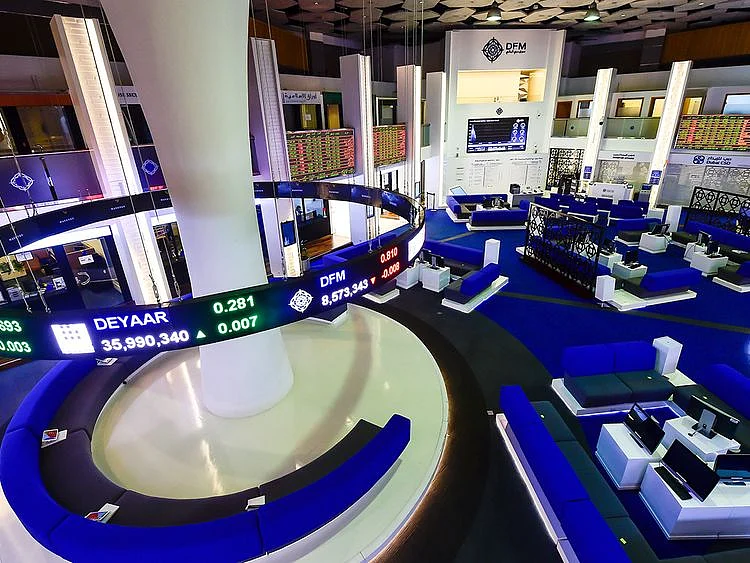UAE stock markets can ride GDP gains for a solid showing in 2023
GDP growth forecasts paint a favourable picture - and that’s UAE stock markets need

After ending 2022 on a high, UAE stocks are poised for a sturdy performance in 2023. Economic activity in the UAE is set to surpass historical trends, buoyed by a pipeline of infrastructure projects, new stock market listings, further recovery in tourism, elevated oil prices, and growing hydrocarbon output. The IMF forecasts non-hydrocarbon GDP growth of 4 per cent in 2023, while the World Bank forecasts UAE to grow by 4.1 per cent.
As such, the UAE is expected to outperform most global economies and be the fastest-growing GCC nation. Reopening of the Chinese economy has bolstered the demand outlook for fuel, lending support to oil prices. Right after lockdown restrictions were lifted, Chinese outbound travel bookings surged 250 per cent while visa applications for international travel rose 12x year-on-year. The UAE will undoubtedly benefit from such pent-up travel demand.
UAE’s real estate sector is defying the global trend of diminishing liquidity and deteriorating market confidence arising from macro-economic headwinds. Stable economic conditions, business reforms, and government initiatives like the Golden Visa are attracting foreign real estate investors to the UAE. The return of Chinese investors is a substantial tailwind. Demand for industrial and logistics space remains high while supply is limited, thereby presenting opportunities.
The GCC region saw record IPO activity in 2022. This trend is set to continue, with Dubai on track to attract new IPO listings. Dubai will also host the MENA IPO Summit during January 23-25 to highlight the growing IPO opportunities in the region. Robust economic fundamentals and regulatory advancements have created an environment conducive to new listings, compelling many privately-owned firms to think of going public.
There is room for the healthcare sector to expand given the pipeline of new hospital projects and strong infrastructure backed by the latest in technologies. The government’s commitment to digital healthcare is a key growth driver. FDI investments in the healthcare sector are rising rapidly, particularly in tele-health, genomics, and personalised medicine.
MENA IPO Summit
Dubai will host the MENA IPO Summit Series during January 23-25 at the Museum of the Future. Helal Saeed Almarri, Director General of the Dubai Department of Economy and Tourism; Mohamed Khalifa Al Hadari, Deputy CEO, Securities and Commodities Authority (SCA); Hamed Ali, CEO, Dubai Financial Market (DFM) and Nasdaq Dubai; Ibrahim Al Haddad, CEO, Salik Company P.J.S.C; Abdulla Belhoul, CEO, Tecom Group; Mohammad Al Bastaki, CEO, Emirates NBD Capital; Alan Willamson, CEO, Taaleem, and Thomas Varghese, CFO, DEWA are some of the prominent speakers.
UAE’s non-oil foreign trade soared 19 per cent year-on-year to Dh1.63 trillion in the first nine months of 2022. Economic diversification initiatives along with expansion of trade will ensure this trend continues.
Tighter monetary policy and a slowdown in oil production are likely to create some headwinds in the first-half of 2023. Nonetheless, increased investments, robust private consumption, and strong momentum in the tourism sector will facilitate output expansion above historical standards.
Inflationary pressures are expected to subside over time as the lagged impact of monetary tightening kicks in. Domestic capital markets will experience further growth, particularly as the federal government issues local currency debt. Although oil and gas output is expected to moderate, ongoing investments will strengthen production capacity and boost headline GDP.
Presently, the DFM General Index is trading 11.5 per cent below its 52-week high while the ADX is 4.9 per cent below its 52-week high. According to Bloomberg forecasts, the five-year median P/E is 10.90x while the year-end EPS is expected to be Dh368.24. Therefore, the DFM General index could potentially rise to 4,013.82 this year. Similarly, the ADX has a five-year median P/E of 15.75x while its year-end EPS is forecast to grow 20 per cent YoY to Dh763.44. This gives the ADX General Index a fair valuation of 12,024.18 towards end 2023.
Network Links
GN StoreDownload our app
© Al Nisr Publishing LLC 2025. All rights reserved.